Google’s John Mueller was asked if “brand mentions” helped with SEO and rankings. John Mueller explained, in detail, how brand mentions are not anything used at Google.
What’s A Brand Mention?
A brand mention is when one website mentions another website. There is an idea in the SEO community that when a website mentions another website’s domain name or URL that Google will see this and count it the same as a link.
Brand Mentions are also known as an implied link. Much was written about this ten years ago after a Google patent that mentions “implied links” surfaced.
There has never been a solid review of why the idea of “brand mentions” has nothing to do with this patent, but I’ll provide a shortened version later in this article.
John Mueller Discussing Brand Mentions

Do Brand Mentions Help With Rankings?
The person asking the question wanted to know about brand mentions for the purpose of ranking. The person asking the question has good reason to ask it because the idea of “brand mentions” has never been definitively reviewed.
The person asked the question:
“Do brand mentions without a link help with SEO rankings?”
Google Does Not Use Brand Mentions
Google’s John Mueller answered that Google does not use the “brand mentions” for any link related purpose.
Mueller explained:
“From my point of view, I don’t think we use those at all for things like PageRank or understanding the link graph of a website.
And just a plain mention is sometimes kind of tricky to figure out anyway.”
That part about it being tricky is interesting.
He didn’t elaborate on why it’s tricky until later in the video where he says it’s hard to understand the subjective context of a website mentioning another website.
Brand Mentions Are Useful For Building Awareness
Mueller next says that brand mentions may be useful for helping to get the word out about a site, which is about building popularity.
Mueller continued:
“But it can be something that makes people aware of your brand, and from that point of view, could be something where indirectly you might have some kind of an effect from that in that they search for your brand and then …obviously, if they’re searching for your brand then hopefully they find you right away and then they can go to your website.
And if they like what they see there, then again, they can go off and recommend that to other people as well.”
“Brand Mentions” Are Problematic
Later on at the 58 minute mark another person brings the topic back up and asks how Google could handle spam sites that are mentioning a brand in a negative way.
The person said that one can disavow links but one cannot disavow a “brand mention.”
Mueller agreed and said that’s one of things that makes brand mentions difficult to use for ranking purposes.
John Mueller explained:
“Kind of understanding the almost the subjective context of the mention is really hard.
Is it like a positive mention or a negative mention?
Is it a sarcastic positive mention or a sarcastic negative mention? How can you even tell?
And all of that, together with the fact that there are lots of spammy sites out there and sometimes they just spin content, sometimes they’re malicious with regards to the content that they create…
All of that, I think, makes it really hard to say we can just use that as the same as a link.
…It’s just, I think, too confusing to use as a clear signal.”
Where “Brand Mentions” Come From
The idea of “brand mentions” has bounced around for over ten years.
There were no research papers or patents to support it. “Brand mentions” is literally an idea that someone invented out of thin air.
However the “brand mention” idea took off in 2012 when a patent surfaced that seemed to confirm the idea of brand mentions.
There’s a whole long story to this so I’m just going to condense it.
There’s a patent from 2012 that was misinterpreted in several different ways because most people at the time, myself included, did not read the entire patent from beginning to end.
The patent itself is about ranking web pages.
The structure of most Google patents consist of introductory paragraphs that discuss what the patent is about and those paragraphs are followed by pages of in-depth description of the details.
The introductory paragraphs that explain what it’s about states:
“Methods, systems, and apparatus, including computer programs… for ranking search results.”
Pretty much nobody read that beginning part of the patent.
Everyone focused on a single paragraph in the middle of the patent (page 9 out of 16 pages).
In that paragraph there is a mention of something called “implied links.”
The word “implied” is only mentioned four times in the entire patent and all four times are contained within that single paragraph.
So when this patent was discovered, the SEO industry focused on that single paragraph as proof that Google uses brand mentions.
In order to understand what an “implied link” is, you have to scroll all the way back up to the opening paragraphs where the Google patent authors describe something called a “reference query” that is not a link but is nevertheless used for ranking purposes just like a link.
What Is A Reference Query?
A reference query is a search query that contains a reference to a URL or a domain name.
The patent states:
“A reference query for a particular group of resources can be a previously submitted search query that has been categorized as referring to a resource in the particular group of resources.”
Elsewhere the patent provides a more specific explanation:
“A query can be classified as referring to a particular resource if the query includes a term that is recognized by the system as referring to the particular resource.
…search queries including the term “example.com” can be classified as referring to that home page.”
The summary of the patent, which comes at the beginning of the document, states that it’s about establishing which links to a website are independent and also counting reference queries and with that information creating a “modification factor” which is used to rank web pages.
“…determining, for each of the plurality of groups of resources, a respective count of reference queries; determining, for each of the plurality of groups of resources, a respective group-specific modification factor, wherein the group-specific modification factor for each group is based on the count of independent links and the count of reference queries for the group;”
The entire patent largely rests on those two very important factors, a count of independent inbound links and the count of reference queries. The phrases reference query and reference queries are used 39 times in the patent.
As noted above, the reference query is used for ranking purposes like a link, but it’s not a link.
The patent states:
“An implied link is a reference to a target resource…”
It’s clear that in this patent, when it mentions the implied link, it’s talking about reference queries, which as explained above simply means when people search using keywords and the domain name of a website.
Idea of Brand Mentions Is False
The whole idea of “brand mentions” became a part of SEO belief systems because of how that patent was misinterpreted.
But now you have the facts and know why “brand mentions” is not real thing.
Plus John Mueller confirmed it.
“Brand mentions” is something completely random that someone in the SEO community invented out of thin air.
Citations
Watch John Mueller discuss “brand mentions” at 44:10 Minute Mark and the brand Mentions second part begins at the 58:12 minute mark





